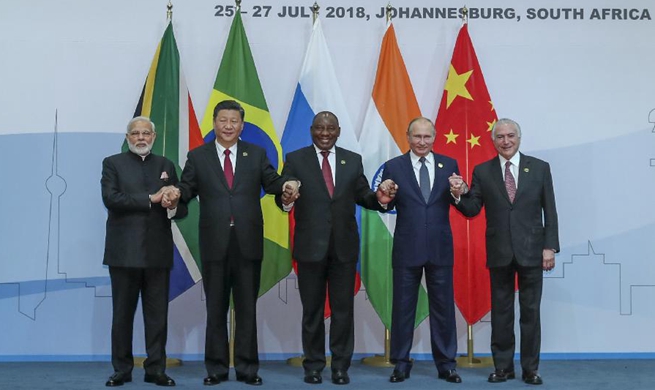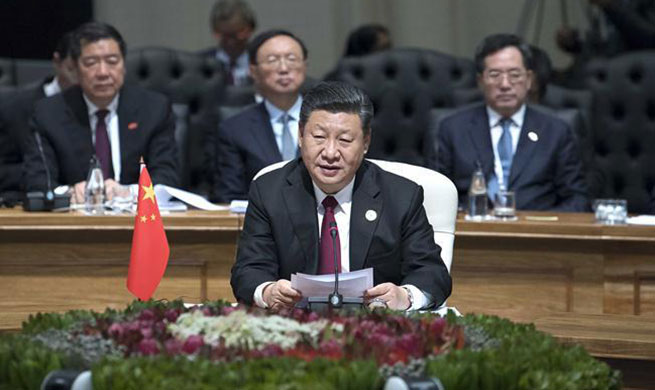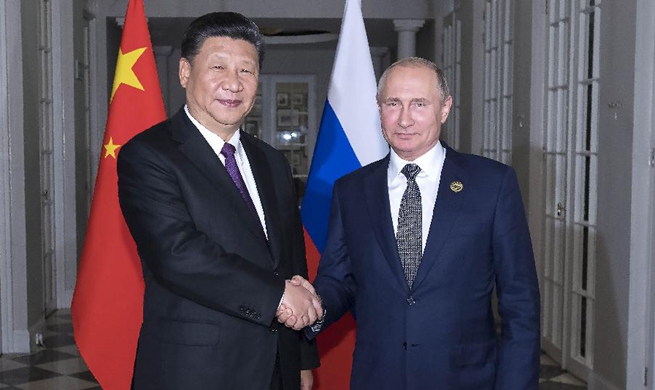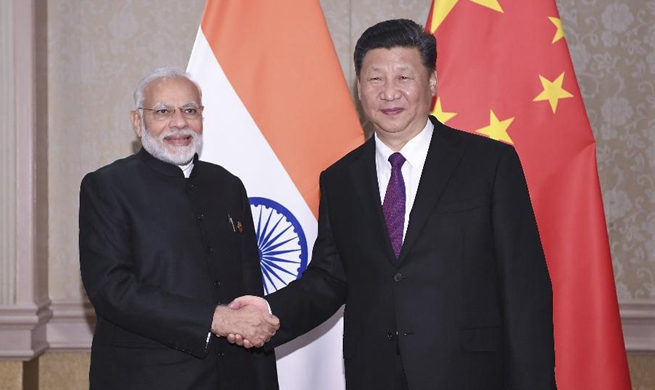By Zhang Hongyi
WUXI, China, July 27 (Xinhua) -- China has reshuffled its national fencing team to catch up with the trends in the world as it focuses on the 2020 Tokyo Olympic Games and aims for the gold medal, said Chinese Fencing Association (CFA) president Wang Haibin here on Friday.
"Instead of six squads, our fencing team has been regrouped into three squads of foil, epee and sabre, on the basis of different forms of weapons," said Wang, also a legendary Chinese fencer who has won a pair of Olympic silver medals as a member of the men's foil team at the 2000 Sydney and 2004 Athens Games.
According to Wang, who became CFA president in 2017, many countries like Russia, Italy and France, have set up their fencing squads on the basis of weapons instead of gender. "It [has] become the trend in the world after the 2012 London Olympics," Wang said.
Right after its own National Games in 2017, China started to reshuffle its fencing team, by signing Hugues Obry and Frederic Baylac, both of France, as head coaches to lead its epee and sabre squads respectively, with Wang himself being the head coach of the foil squad.
To cast aside the gender classification system, "our women fencers will be greatly helped by their male peers during their training sessions since different fencing weapons require different techniques and apply to different rules," said Wang who started his coaching career right after the 2004 Athens Games.
At the World Fencing Championships which concluded here on Friday, China won the bronze medal in the women's epee team event, the only medal for the hosts, apart from a string of top-eight placings elsewhere.
"The World Championships has been the first and biggest trial for our young fencers after our team-reshuffling," said Wang, a 45-year-old native of Jiangsu province. "We found something positive despite their lukewarm performance since most of them only made their debutant at the world fencing arena."
"We know our placings in the world, and we also have upperhands as our women fencers are of good quality, and their competitions are not as tough as those for the men fencers in the world," said Wang.
In the women's sabre at the worlds, Shao Yaqi even toppled world No. 1 seed and three-time world champion Olga Kharlan of Ukraine 15-13, and beat Martina Criscio of Italy 15-13 en route to the last eight, while her teammate Qian Jiarui also made it to the quarters by eliminating Romanian Bianca Pascu.
As for the Tokyo Games where the women fencers will be China's medal hopefuls, Wang foresees an unprecedented entry of the Chinese fencers in all the fencing disciplines.
"It has never been the case for China to send our fencers to compete in every fencing discipline during the Olympic Games, but we hope to achieve the feat at the Tokyo Games," said Wang, a four-time Olympian who made his debut in 1992 Barcelona Games and competed in four consecutive Olympics after that.
After becoming a member of the International Fencing Federation in 1974, China has reaped four Olympic gold medals in total with the first coming in the 1984 Los Angeles Games with Luan Jujie winning women's foil, and Zhong Man winning the first for men fencers in the 2008 Beijing Games in sabre, before Lei Sheng became the first men's foil Olympic champion at the 2012 London Games where China's women epee team also struck the gold medal.
Although Wang himself failed to win an Olympic gold medal as a foil fencer, his disciple Lei helped him realize his dream in London. And both Lei and Zhong have become Wang's aides as coaches at the Chinese national team.
"And I hope our Chinese coaches will mature smoothly enough in the future to take the sole responsibilities to guide our national teams someday," said Wang.
For Wang, the Tokyo Games will also become another big platform to promote the sport throughout the country, as he hopes to attract more and more students as well as kids to the sport.
"We hope fencing will also become one of the sure bets for China to win gold medals during the Olympic Games," said Wang, adding "fencing is a sport very suitable for our Chinese with great skills and agile moves."
And China has an envious population of fencing fans as there are more than 500 clubs registered with some 200,000 members throughout the country, said Wang.
"As CFA president, I will do my utmost to convince our national Department of Education to include fencing into the competition agenda of the University Games in the near future, in order to attract more students to the sport at the campus level," Wang said, adding that fencing clubs are found in every one of the top 100 universities in the United States.

















